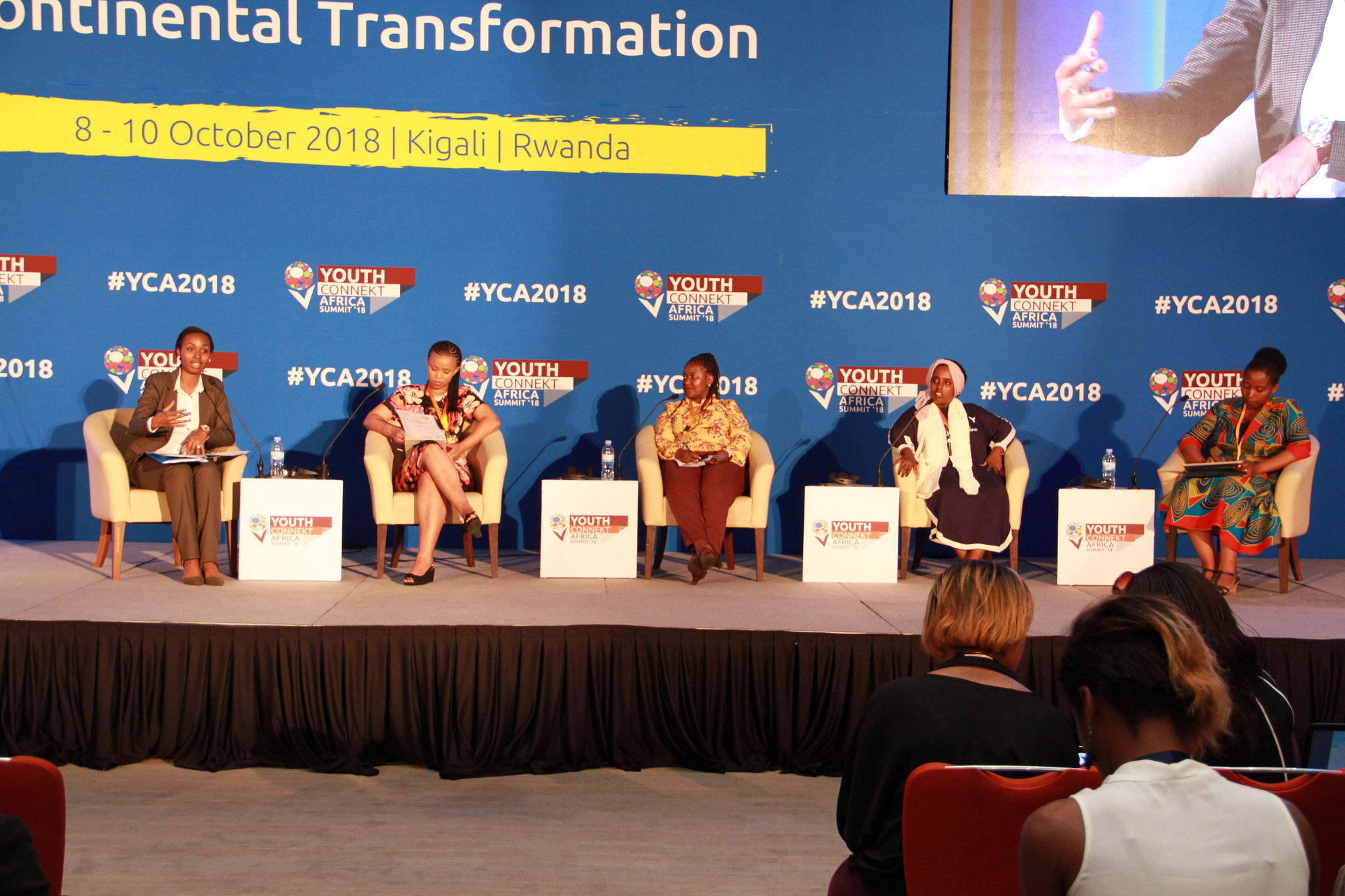Connekt girl session during the the Youth Connekt Summit 2018
Rwanda is consistently ranked among the leading countries in Africa and across the world on promoting gender equality and the empowerment of women. However, despite the considerable progress made in many areas, women and girls still have less access to productive resources and face more difficulties than men in gaining access to decent work and productive employment opportunities.
Rwanda’s poverty profile indicates that women are more likely to be poor than men, partly because they are more often employed in the low income agricultural and informal sectors. Similarly, the unemployment rate among females is higher than for males. Regarding education, while there is general gender parity at the primary and lower secondary levels, a noticeable disparity between males and females is observed at the upper secondary and university levels. Challenges exist in other areas and are often attributed to a variety of historical factors, including cultural barriers that box women into traditionally defined roles.
Against this background, gender equality and youth empowerment have been put at the forefront of many development initiatives implemented by the Government of Rwanda and One UN. Gender equality is both a standalone outcome and a cross-cutting priority of the new UN Development Assistance Plan 2018-2023. Gender equality also features prominently in the new UNDP Country Programme for the same period. Among other things, UNDP has initiated a robust partnership with UN Women to address gender equality and youth empowerment through the YouthConnekt Programme.
YouthConnekt seeks to empower young people and connect them with leaders from the public and private sectors and civil society. It forges partnerships that can provide employment and entrepreneurship opportunities as well as internships, mentorships, training, etc. The platform also raises youth awareness of job opportunities, business incubation centres, financial products and services, and more.
The YouthConnekt Initiative combines elements of skills development, entrepreneurship, access to jobs and finance, awareness of youth development, and promotion of youth citizenship. Accomplished through community work and inclusion in local and national policy dialogues, the YouthConnekt Initiative has proven to be a very innovative and effective way of facilitating the demographic transition, promoting civic engagement, and creating high productive off-farm jobs.
Through YouthConnekt, focus is being placed on the roles of girls and women. For example, one component of the programme supports the Miss Geek Competition, which is an innovative information communication technology (ICT) initiative aimed at encouraging women to develop ICT projects. It also promotes online debates on the role of women in ICT and entrepreneurship.
Connekted Girls Hub
Another key component is the Connekted Girls Hub, which is part of the annual YouthConnekt Africa Summit. Since 2017, UNDP and UN Women have partnered to organize the summit which serves as a continental platform to empower and connect young people. YouthConnect Africa has five objectives:
- Create 10 million jobs for youth
- Empower 25 million youth with skills
- Nurture 1 million young leaders
- Connect 100 million young Africans
- Close the gender gap
As part of the annual Summit, UN Women has been supporting the organization of Connekted Girls sessions which feature successful women and girls in Africa and advocates for their empowerment through lively and engaging discussions. As such, the Connekted Girls Hub has attracted many inspiring and successful African women, including government ministers, doctors, engineers, CEOs, entrepreneurs, and software developers. These sessions question traditional gender norms and mindsets, challenge the status quo, and advocate for the removal of gender discriminatory legal practices.
Using debates, Ted Talks, panel discussions, videos, and one-on-one sessions, the Connekted Girls Hub has sharpened focus on a range of thematic issues relevant to young women. These issues include: economic empowerment, educational opportunity, increased participation in the fields of science, technology, engineering, and mathematics (STEM), and access to finance for female entrepreneurs. These thematic areas are closely aligned to Sustainable Development Goals 3 (good health), 4 (quality education), 5 (gender equality), and 8 (decent work and economic growth).

In the 2018 edition of the Connekted Girls Hub, increased focus was placed on women in STEM. The session was led by five female technical specialists and innovators who discussed ways to support and prime young girls to enter the STEM fields. The session recognized the many barriers which women may face when entering these male dominated fields, noting that decisions to have children or to get married often create significant obstacles for women. The session concluded by calling for progressive policies to address these challenges.
A second session, conducted in partnership with UNFPA, centered on the topic of reproductive health and teen pregnancy. Four panelists led an open and invigorating discussion on the causes, current approaches, outcomes, and potential improvements in these areas. One conclusion of the panel was that the issues which young women face include traditional cultural norms inhibiting their ability to negotiate sexual terms and a lack of available, and accurate sexual health information. By incorporating topics of sexual consent, and the responsibility of men in pregnancy, the panel demonstrated the complexity of reproductive health and the need to brainstorm innovative solutions.
For Rwanda to accelerate its development, it is essential for the country to better utilize the talents and potential of all its people, including women and girls. However, there are deep rooted challenges requiring strong commitment and integrated cross-sectoral policy and programmatic actions. YouthConnekt Africa offers a promising path forward, bringing multiple stakeholders together to support the aspirations, talents, and fundamental rights of young women and girls. Importantly, it brings out the core message that youth, both young women and men, are key to the future development of both the country and the continent.

 Locations
Locations